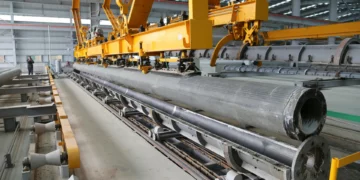The world is working towards ‘sustainability’ quite seriously. Such an attempt has been taken by various corporate houses purchasing ‘sustainable aviation fuel’ (SAF) to reduce mass production of the cleaner energy required by the airlines to meet their emissions targets.
SAF is produced from sustainable feedstocks. Though similar to traditional fossil jet fuel in its chemistry, using SAF results in a reduction in carbon emissions compared to traditional jet fuel. It replaces the lifecycle of jet fuel. SAF’s lower carbon intensity makes it an important solution for reducing aviation greenhouse gases.
Sustainable Aviation Fuel accounted for only 0.5 per cent of aviation fuel in 2021, but many airlines have a target of 10 per cent by 2030, and the industry’s goal of “net zero” emissions by 2050 relies on SAF accounting for 65 per cent of fuel.

Recently Qantas Airways announced that five companies would pay a premium to reduce their emissions by contributing to the cost of the airline using SAF supplied by BP at London’s Heathrow Airport.
Participant Boston Consulting Group (BCG), which also purchases SAF through United Airlines and fuel suppliers SkyNRG and Neste, said it has been looking to scale up the Sustainable Aviation Fuel market to meet internal targets. “Our largest source of emissions comes from business travel, and there we have committed to cut our emissions intensity in half by 2025, compared to 2018,” BCG Chief Sustainability Officer David Webb said.
According to Denise Auclair, the corporate sector interest could build momentum for the SAF industry to scale up, given businesses account for around 20 per cent of air travel globally and 30 per cent in Europe. Auclair is the corporate travel campaign manager at the European non-governmental organisation Transport & Environment.
Buying Sustainable Aviation Fuel is more expensive compared to buying emissions offsets, but experts say it can play a crucial role in reducing travel emissions alongside switches to video-conferencing and cleaner alternatives like railways.
Companies are paying a ‘green premium’ when they purchase SAF, given it costs around three to five times more than conventional jet fuel, said Sami Jauhiainen, vice president of APAC at Neste’s renewable aviation business, the world’s largest, which offers a corporate buying programme.
Why is SAF important to the world?
A return flight between London and San Francisco has a carbon footprint per economy ticket of nearly 1 tonne of CO2e. With the aviation industry expected to double to over 8 billion passengers by 2050, we must act to reduce aviation’s carbon emissions, and SAF is one way to do that.
Sustainable Aviation Fuel gives an impressive reduction of up to 80% in carbon emissions over the lifecycle of the fuel compared to the traditional jet fuel it replaces, depending on the sustainable feedstock used, production method, and the supply chain to the airport.
Is SAF the key to making the aviation industry greener?
SAF can drop straight into existing infrastructure and aircraft. It has the potential to provide a lifecycle carbon reduction of up to 80% compared to the traditional jet fuel it replaces. SAF will play a really important role in meeting the aviation industry’s carbon reduction targets. However, we need to use all the options to reduce our available carbon. There are several broad opportunities for carbon reduction across the industry, such as more efficient aircraft design, smarter operations, and the development of future technologies like electrification.

















